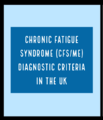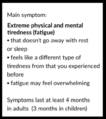National Health Service

The National Health Service (NHS) is the UK's universal health care provider, and is free at the point of need (exception for minor charges like some prescriptions, glasses, or dental care).[1] The NHS was created in 1948, with the aim of providing good health care to all, regardless of wealth. The NHS provides healthcare to over 64 million, and the NHS website is the UK's biggest health website. [1][2]
The NHS is publicly funded; mainly through UK taxes and National Insurance (social security) deductions from employers' and individuals' personal income.
NHS diagnostic criteria for CFS/ME[edit | edit source]
The Fukuda criteria for Chronic Fatigue Syndrome are used to diagnosis CFS/ME in the UK.
Extreme physical and mental tiredness (fatigue)
- that doesn't go away with rest or sleep
- a different type of tiredness from you experienced before
- fatigue may feel overwhelming
Other symptoms may include:
- sleep problems, such as insomnia
- muscle or joint pain
- headaches
- a sore throat or sore glands that aren't swollen
- problems thinking, remembering or concentrating
- flu-like symptoms
- feeling dizzy or sick
- fast or irregular heartbeats (heart palpitations)
Symptoms last at least 4 months in adults (3 months in children).
Exercising usually makes the symptoms of worse.
Sometimes the effect is delayed and you'll feel very tired a few hours after you've exercised, or even the next day.
Source: NHS (2018)
This has been criticized as being too broad. [3]
NHS treatment of ME/CFS[edit | edit source]
The NHS regards Chronic Fatigue Syndrome and Myalgic Encephalomyelitis as the same illness, and refers to both as Chronic Fatigue Syndrome. Specialist services are commissioned in some areas; in other areas GPs provide treatment instead. [3]
NICE Guidelines[edit | edit source]
British patients receive free care from the NHS, but treatments generally to follow the NICE guidelines from 2007.[3] A recent review of these heavily criticized NICE guidelines resulted in the decision to update them.[3] Currently, the NICE guidelines recommend that Graded exercise therapy (GET) and Cognitive behavioral therapy (CBT) should be offered, based on evidence the PACE trial. The guidelines also cover pacing, lifestyle changes and medication options. There are no medications licensed for CFS/ME, but medications are available for some symptoms.
See an example "Chronic Fatigue Service" described here.
Learn more[edit | edit source]
Chronic Fatigue Syndrome (CFS/ME) - NHS
NHS Choices[edit | edit source]
NHS Choices is a consumer facing web site published by the National Health Service. It provides summarised information for both lay people and clinicians about health conditions, recent research as well as information such as how to find a local General Practitioner (GP).
The NHS Choices coverage of ME/CFS research has been criticised for publishing uncritical coverage of studies related to the PACE trial.[5]
References[edit | edit source]
- ↑ 1.0 1.1 "About the NHS". National Health Service. Retrieved October 4, 2018.
- ↑ NHS. "About us". NHS. Retrieved October 4, 2018.
- ↑ 3.0 3.1 3.2 3.3 NICE (August 2007). "Chronic fatigue syndrome/myalgic encephalomyelitis (or encephalopathy): | Guidance and guidelines | Surveillance Decision | NICE". NICE. Retrieved October 4, 2018.
- ↑ NHS (May 16, 2017). "Chronic Fatigue Syndrome - Symptoms". NHS. Retrieved October 4, 2018.
- ↑ No Dissing! NHS Choices Behind the Headlines needs to repair relationship with its readers by James C. Coyne - Quick Thoughts - Nov. 29, 2015





